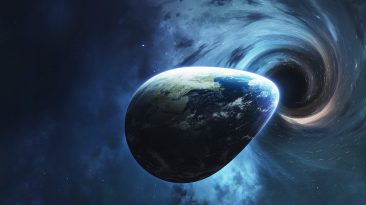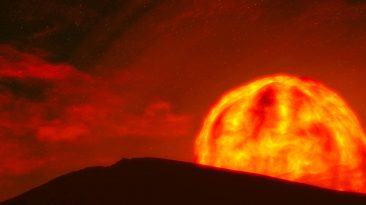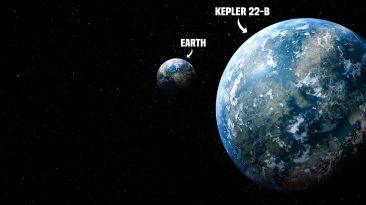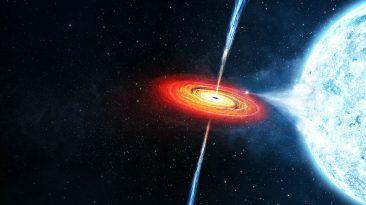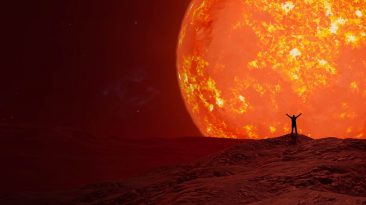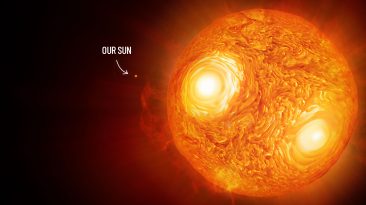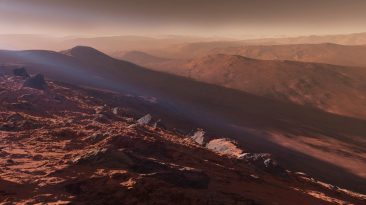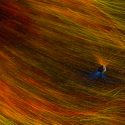In space, no one can hear you scream. But just because sound can’t travel in the vacuum of space doesn’t mean that the planets and our Sun don’t make noise. What would they sound like if you could hear them? How are we able to capture these complex sounds? And how do these sounds change our understanding of the planets?
Sound is the result of pressure waves created by vibrating objects. For you to hear a sound, molecules need to carry those vibrations from their source to the very tiny bones inside your ear. There, they are converted to signals and sent to your brain. And, voila, you hear my voice.
Soundwaves always require a medium to travel through, such as air or water. In the vacuum of space, there are too few molecules to carry these vibrations.
But that doesn’t mean that the planets and our Sun aren’t making sounds. There’s just no way for them to reach us.
But if we can’t hear the planets, what are these mysterious noises that NASA made public?
The Sun and the planets in our Solar System each have their own soundtrack. But it’s not what you might expect. Our planetary neighbors emit electromagnetic waves at different frequencies. Radio waves are one form of electromagnetic wave. And any astronomical object that has a magnetic field could generate them. These could then be recorded by satellites or space probes.
It’s these electromagnetic vibrations that NASA has been capturing and translating into sound. It’s the same approach as if you translated a color like red into one sound and blue into another. But the sounds captured in the recordings are still not audible to the human ear. Their frequency is just too high. So the versions published by NASA have been slowed down. And now, at a lower frequency, you can hear the strange eerie tones of our Solar System.
Let’s start with the most energetic object in our Solar System, the Sun. Huge rivers of solar material are constantly traveling and bouncing around inside of it.
Scientists have translated that energy into something that seems like a soothing meditation. So close your eyes and soak up that constant, pulsating humming.
Mercury has an eerie tone. It’s quiet with small amounts of crackling. It’s almost like sitting on the top of a mountain, with some really strong wind, of course.
The sounds of Venus are deep and metallic. A droning, almost like a siren rattling through an old empty industrial space.
Thanks to NASA’S Perseverance rover, we have recordings of sounds from the surface of Mars. On these recordings, you can hear the rover driving around and shooting lasers. But what does Mars, the planet, sound like from space? You would hear a strong, howling wind as if you were hiding inside a shelter during a storm.
Jupiter is a loud planet. This is because of intense radio storms resulting from interactions between the planet and its moons. This recording from the spacecraft, Juno, captures what sounds like the bow shock. This is the transition point where solar winds collide with Jupiter’s magnetosphere. The sounds suddenly plunge from high-pitch to a deep and low boom.
This terrifying noise is Saturn. It was measured by the Cassini spacecraft, and it sounds like a robot howling in agony during a windstorm. There’s even a melody that drops in and out. Saturn could make an excellent soundtrack for a sci-fi or horror film.
Uranus sounds like some seriously strong wind. Almost like what you would hear if you stuck your head out of a jet plane at cruising speed. But, um, don’t do that.
Nearing the end of our sonic journey, Neptune is quieter than its neighbors. Almost as satisfying as listening to the ocean.
And while Pluto isn’t a planet, you wouldn’t want to pass up the chance to hear what it is like. This eerie tone could remind you of church bells. Mix that with some more traditional sci-fi sounds, and you’d have an almost religious experience.
But what about Earth? You already know what it is like down on the surface. But how does it sound from space? It turns out Earth sounds heavily distorted, almost like radio interference. And pulsating whooshes that could resemble cars passing by on a highway. Ok, it’s not the most peaceful or intriguing of planet sounds. But we humans do have a way of changing the planet we live on. Maybe one day, we’ll go to Mars. And after 100 years on it, we’d change its tune too.
Sources
- ” The Physics Classroom Website “. 2021. physicsclassroom.com.
- “Video for your ears: What do planets sound like?“. Emily Howard. 2013. earthsky.org.
- “Introduction to Electromagnetic Waves”. 2021. courses.lumenlearning.com.
- “How Well Does Sound Travel Through Different Mediums?”. 2021. uspto.gov.
- “Space Roar: NASA Detected The Loudest Sound In The Universe, But What Is It?”. David Crookes. 2020. space.com.













